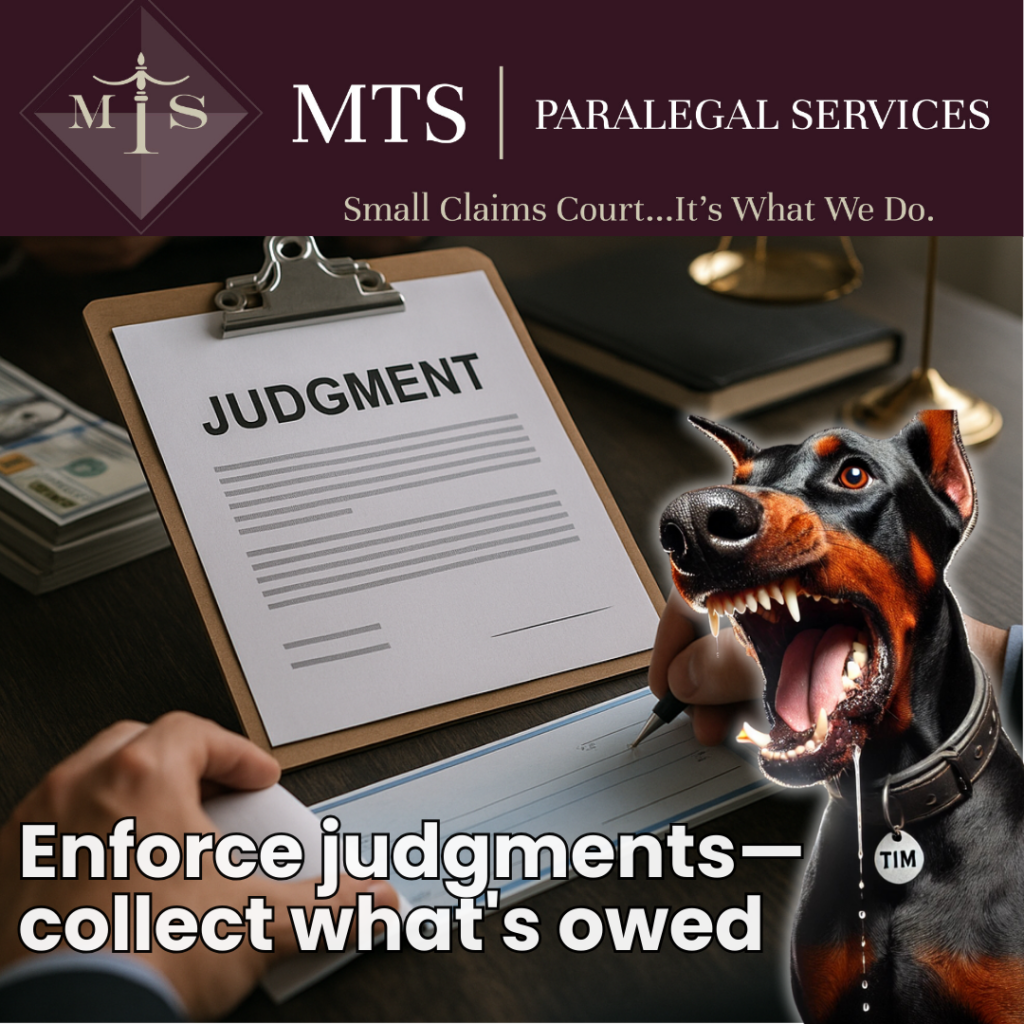
Collecting Money Owed: Enforcing Judgments in Small Claims Court
When a court has ruled in your favour and awarded a monetary judgment, collecting that money can often be a separate challenge. In Ontario, Small Claims Court judgments do not enforce themselves. Creditors must initiate enforcement procedures to recover what is legally owed. This article outlines the key processes involved in enforcing judgments and collecting money owed, with insights tailored to Ontario’s Small Claims Court system.
What Happens After Judgment?
Winning a Small Claims Court case and receiving a judgment does not automatically ensure payment. The debtor may comply voluntarily, but in many cases, the creditor must take further legal action to recover the funds. This is where MTS Paralegal Services steps in to assist creditors in understanding and navigating their enforcement options.
Step 1: Determine the Debtor’s Assets
Before pursuing enforcement, it is critical to determine whether the debtor has assets or income that can be legally accessed. If this information is not readily available, creditors can request a Judgment Debtor Examination, a court-ordered interview where the debtor must disclose their income, property, and financial status under oath. This step is vital to decide on the most effective enforcement mechanism.
Step 2: Enforcement Options in Ontario
There are several methods available in Ontario’s Small Claims Court to enforce a judgment:
a) Garnishment
This allows a creditor to seize money owed to the debtor by a third party, most commonly wages or a bank account. A Notice of Garnishment can be served on the debtor’s employer or financial institution. This is one of the most effective tools in collecting money owed, especially if the debtor is employed or has available funds.
b) Writ of Seizure and Sale
A Writ of Seizure and Sale of Personal Property permits the seizure and sale of the debtor’s non-exempt assets by the sheriff. While this can be a more complex process, it is useful if the debtor possesses valuable property.
c) Writ of Seizure and Sale of Land
If the debtor owns real property, a Writ of Seizure and Sale of Land may be filed with the sheriff. This writ places a lien on the property, which must be discharged before any future sale or refinancing. It can also lead to a forced sale of the land, although this is rare and typically a last resort.
d) Payment Hearings
If the debtor has failed to pay voluntarily, creditors can request a Payment Hearing to establish a payment schedule. This is enforceable by the court and helps maintain accountability.
Timely Enforcement Matters
Creditors should note that there are limitation periods on enforcement. Under Ontario law, judgments are enforceable for up to six years, unless renewed by the court. Delaying enforcement can reduce your chances of collecting the full amount owed.
Why Choose MTS Paralegal Services?
Navigating Small Claims Court procedures and enforcement laws in Ontario can be complex. MTS Paralegal Services, led by Tim, provides knowledgeable, professional guidance throughout the collection process. Whether you’re garnishing wages or placing a lien on a debtor’s property, Tim at MTS ensures the necessary forms are properly filed and deadlines met.
If you’re owed money and have a court judgment in your favour, it’s time to take the next step. Call Tim at MTS Paralegal Services today at (226) 444-4882 for professional support with enforcing judgments and collecting money owed through Small Claims Court. Your money matters—let us help you collect what you’re legally entitled to.
This content does not constitute legal advice. For up-to-date guidance or legal advice specific to your situation, please contact MTS Paralegal Services Professional Corporation or call (226) 444-4882.
